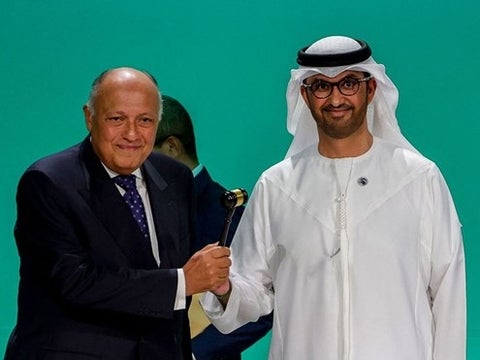Funds and Fossil Fuels: Building resilience at COP28
By Miswar Syed, Faculty of Engineering
In a monumental event that captured the world's attention, COP28 brought together over 100,000 people to discuss and address the urgent challenges posed by climate change. One significant outcome was the launch of a $725 million fund, aimed at assisting developing nations grappling with the detrimental effects of climate change, including extreme weather, rising sea levels, and biodiversity loss.
Breaking new ground, COP28 took a bold step by unanimously agreeing to eliminate the use of fossil fuels. This commitment requires participating countries to explore alternative energy sources, moving away from coal, oil, and gas. The objective is to achieve this transition in a fair and organized manner, with the goal of achieving net-zero emissions by 2050. This marks the first time there has been a clear and urgent call to end the use of coal, oil, and gas, which are major contributors to the climate crisis.

Figure 1. Global leaders convene in Dubai for the COP28 Global Climate Action Summit.
A reality check in Dubai revealed that no major emitting country is currently doing enough to meet Tthe Paris Agreement of keeping global warming below 2°C. Despite the pressing time constraints, countries are increasingly focusing on preparing for the impacts of climate change. The "UAE consensus" underscores the ongoing pressure to transition away from fossil fuels.
COP28 proceedings also highlighted a global shift towards cleaner energy solutions. The agreement includes plans to triple the use of renewable energy and support emerging technologies such as hydrogen, nuclear power, and carbon capture. To ensure a smooth transition, there is a consideration of using natural gas as an interim solution, especially as we await the widespread adoption of technologies like hydrogen and nuclear power in the 2030s.

Figure 2. COP28 President Sultan Ahmed Al Jaber (Right) alongside Egyptian Foreign Minister and COP27 President Sameh Shoukry (Left) at the commencement of COP28.
COP28 secured approximately $2.7 billion for conservation efforts. Many countries pledged to contribute $100 billion by 2027 to support nature-positive initiatives. There is a growing commitment to preserving ecosystems, including mangroves, with an emphasis on oceans and blue carbon in national plans.
Finally, a new $30 billion fund was initiated to involve private companies in clean and resilient projects, particularly in less affluent countries. Collaborative efforts by the World Bank, the International Finance Corporation, and the World Economic Forum will play a crucial role in making this initiative a reality. COP28 stands as a pivotal moment in global efforts to combat climate change and transition towards a sustainable future.
Find out more about our COP28 delegations here.